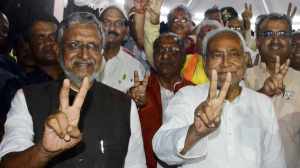Hizbul ends ceasefire, blames India
Karachi, August 8: Angered by what it called India's cold shoulder to its gesture of peace, the Hizbul Mujahideen this evening called off ...

Karachi, August 8: Angered by what it called India’s cold shoulder to its gesture of peace, the Hizbul Mujahideen this evening called off its ceasefire in the Valley saying that New Delhi had let down a golden chance.
The Hizb said that India refused to allow Pakistan to participate inpeace talks aimed at settling the protracted Kashmir dispute and this hascaused the organization not to extend its ceasefire when it expired at 5 pmtoday.
At a news conference in Islamabad, Hizbul chief Syed Salahudin said that he had instructed his field commanders to resume their hostilities against Indian targets and take up from where they left. “They will resume their activities with a bang,” said one Hizb official at the press conference.
Salahudin said his militant group staked its reputation on the ceasefireoffer which it made on July 24 and which India had welcomed. “We made thismove without taking our fellow organizations into confidence. We staked ourname and our reputation on peace. We have been let down,” he toldjournalists.
Other militant groups fighting in Kashmir denounced the ceasefire and vowedto continue what they called their jehad or holy war to end “Indian rule inKashmir.”
Salahudin’s Hizbul was suspended from the United Jehad Council, an organization of 14 guerrilla groups fighting in Kashmir, following the ceasefire announcement.
“It needs to be pointed out that we put our entire credibility of 12 yearsat stake for our (desire) to facilitate a peaceful resolution,” said Salahudin.
Analysts say that the ceasefire was considered the most significantbreakthrough since militancy began in the Valley in 1989.
“This peace offensive has not been reciprocated by India, who havedemonstrated their traditional intransigence,” said Salahuddin.
“The Indian leadership has failed to respond to our icebreaking move whichcould have become productive and meaningful if India had acceptedunconditional tripartite talks between India, Pakistan and Kashmiris,” hesaid.
India had agreed to talk to the militants but flatly refused to acceptPakistan at the negotiating table.
There are indications in Islamabad that the ceasefire withdrawal became aforgone conclusion after New Delhi refused to allow Pakistan to participate.
`Jehad gains momentum’
* Lashkar-e-Toiba: “It makes us very happy…our jehad in Kashmir will gain further momentum.”
* Al-Badr Mujahideen: “Hizbul has averted a serious threat to the Kashmiri struggle and exposed India’s intransigence.”
* Harkatul Mujahideen: “It’s a very wise move, otherwise the freedom struggle would have suffered a major blow.”
* Mutahidda Jihad Council: “The decision clears the way for the Hizbul’s return to the umbrella group from which it was expelled.”
* Jamaat-e-Islami: “We knew from the very first day that India is not sincere in resolving the Kashmir issue.”



- 01
- 02
- 03
- 04
- 05




























